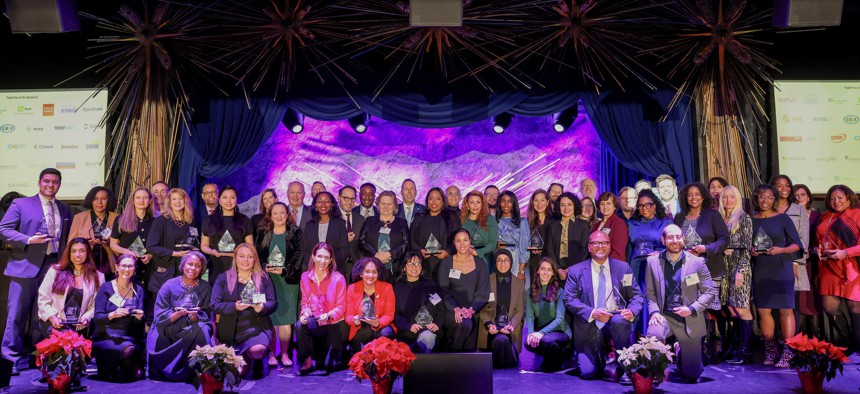New York State
Leaders in business, the nonprofit sector and government honored at City & State’s 2023 Responsible 100 award ceremony
The annual event celebrated New York’s most impressive visionaries with keynote speakers Andrew Yang and Jamie Torres-Springer.

City & State’s 2023 Responsible 100 Rita Thompson
City & State’s 2023 Responsible 100 awards ceremony gathered some of New York’s most conscientious leaders, hailing from various sectors, including business, the nonprofit world and government. The event hosted at Sony Hall near Times Square on Thursday celebrated award recipients for their charitable efforts, community engagement and commitment to diversity, equity and more.
Among the keynote speakers, former presidential and former mayoral candidate Andrew Yang, now co-chair of the Forward Party, reflected on his time leading his educational nonprofit, Venture for America. “So if you have worked in a nonprofit, they run on two things: passion and money. And you're not allowed to really talk about the money part, so you lead with the passion part. I was very, very passionate about the organization that I'd started. But I had this sinking feeling that we weren't actually trying to solve the problem that I at least set out to solve,” he told attendees, in a reference to what motivated him to run for the presidency and later the mayoralty.
“And I imagine that many of you will have similar feelings of, ‘I'm not sure I feel positive or optimistic about the future of either this issue or maybe the country at large,’” he added. “So this is what drove me into the presidential race four years ago where I had that feeling. I set out to make a case for a dramatic antipoverty platform that was based on not anything I thought of, but it was based on something that Martin Luther King fought for.”
Yang recalled serving on a panel with Michael Tubbs, mayor of Stockton, California. “He said to me, ‘Andrew, you can say shit I can never get away with because if a young black mayor went around and said you should give everyone $1,000 a month, they would laugh at me and throw me out of the room. But if the magical Asian man from the future [says that] people actually say, oh, you should really give us some thought.’ So I made that case.”
Yang expressed hope, urging attendees to remain focused towards actualizing change in their respective industries.
“And the challenge I submit to you all, the 100, most socially responsible corporate leaders in New York City can't solve a particular problem, then who's going to?” he asked. “One of the big lessons of adulthood is to realize that it's us, there is not some other group. You all are, in many ways, the greatest hope for this city, the most important city in this country. And thus, I'm going to suggest the country at large.”
Jamie Torres-Springer, president of construction and development of the Metropolitan Transportation Authority, echoed this statement during his keynote, while highlighting details of the 2nd Avenue Subway station, future projects and congestion pricing.
“We're about to enter construction on phase two of the Second Avenue subway, which will send the Q train up to East Harlem, where it'll serve an additional 100,000 daily riders in the city's most transit-dependent neighborhood,” Torres-Springer said. “We're working in the East Bronx to add four new commuter rail stations that will bring Metro North service into Penn Station. And at Governor Hochul’s direction we’re advancing a project called the Interborough Express, which will bring currently underserved neighborhoods in Brooklyn and Queens up to Jackson Heights by repositioning an underused freight rail line.”
The projects are geared to generate construction opportunities for small businesses, minority and women-owned business enterprises and disadvantaged business enterprises.
Torres-Springer also mentioned the MTA’s commitment to continued sustainability, and reinforcing infrastructure to better withstand the effects of climate change. He defended the MTA’s congestion pricing plan, stressing that New York riders will most benefit from additional fees.
“We're proud to be implementing the [congestion pricing] program, which was mandated by the state legislature in 2019. There are strong opinions, but it will support cleaner air, better emergency services for those ambulances, those police cars that can't get around the city,” he explained. “Difficult mobility on the city streets will be addressed by this, but I think everybody can agree on this – those charges will fund much of the MTA capital work and the improvements in our system that I've been talking about.”
While the event highlighted the hard work of New York’s most exceptional leaders, the speakers noted how there is still much more to be done.
“So if you see a problem that you have that sinking feeling about, I hope that you consider doing a little bit more and being able to say to yourself: you know what, I'm going to try and actually solve that problem,” Yang told attendees. “And if it doesn't work, at least I will know that I gave it my all, and that I gave myself a chance to succeed because the city and the country and the world needs us to succeed.”
